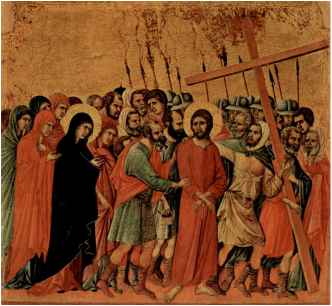This post was originally published on the Institute for Christian Studies' blog, groundmotive.net.
Simon of Cyrene, as his name suggests, was a visitor to Jerusalem. His story is found in all three synoptic gospels but is noticeably absent in John’s account. Each gospel account begins with Jesus mocked and beaten by soldiers, after which he descends to Golgotha. However, as he begins his descent, the soldiers force a man from Cyrene, Simon, to carry Christ’s cross on his behalf.
I want to draw your attention to three aspects of this story. First, Christ needs help, he depends on Simon. Simon, in a sense, saves Christ’s life. Without help, it seems, Christ would have died even before he was able to begin his march towards the place of the skull. Second, Simon is forced to help, although just a sentence or two in each gospel, each account makes sure to specify that Simon doesn’t have a choice in the matter. Finally, it’s noteworthy that the idea of carrying one’s cross is foreshadowed in the Gospel of Luke. In Luke Chapter 14, Christ tells his disciples that the cost of discipleship will require them to a) hate their family and ultimately hate their own life; and b) take up their cross and follow him. Although I don’t want to discuss the specific meaning of this verse here, I think it’s fair to say that Jesus, and Luke specifically, considered carrying one’s cross to be related to one’s sense of belonging to a particular family. With these three points in mind, let us consider a contemporary parallel.
Jean Vanier recently wrote an op-ed for The Globe and Mail that addressed the issue of assisted dying. Although some may be disappointed that Vanier doesn’t absolutely condemn assisted dying, I believe that he accurately describes a dangerous failure in our society that must be considered regardless of our views on this sensitive issue.



 RSS Feed
RSS Feed

